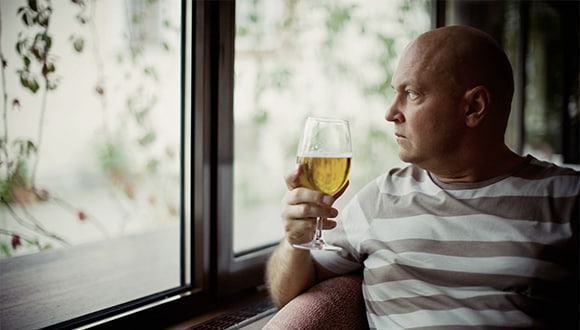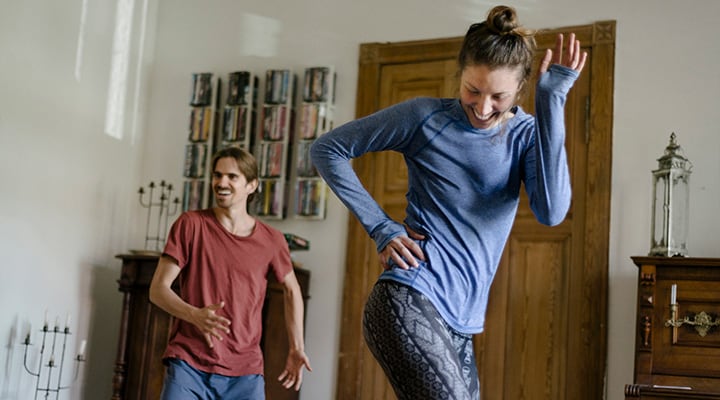Alcohol consumption and the dangers of the reward system
Alcohol consumption is part of Australian culture and for many of us, drinking is seen as a well-earned reward after a tough day. But how can you replace that daily reward with a healthier gratification?
“You can get it ridin’, you can get it slidin’, you can feel it comin’ on about four,” says the hard-yakka voice etched into every Australian mind of a certain generation. “A hard-earned thirst needs a big cold beer.”
You can also get it looking after your kids, after dealing with difficult customers or dozens of other situations that feel like they need compensating with an alcoholic drink.
But rewarding yourself with alcohol comes with its own problems. In terms of public health, the risks of alcohol consumption are high. Alcohol is responsible for 5% of diseases globally. In Australia, alcohol consumption puts 430 people in hospital and causes 15 deaths every day. According to the Australian Institute of Health and Welfare, alcohol is the most commonly treated substance abuse disorder in the country.
But it seems many of us know our relationship with alcohol needs changing before it gets that serious. In fact, one in four Australians say they’re not happy with their levels of alcohol consumption, according to a survey conducted by HCF and Hello Sunday Morning, a group that supports people trying to change their relationship with drinking.
Three years ago, Jada Bennett-Cross was feeling like she needed to make that change.
“I always woke up with some anxiety – 4 o'clock in the morning – thinking, feeling terrible, and needing to drink water and feeling like I'd overdone it yet again,” says Jada.
“It was a vicious cycle.”

Stress and alcohol consumption
Jada doesn’t drink alcohol now, but she used to drink quite a lot – not just at parties or social events, but at home, at a certain point in the day, with still more hours to get through before it was over.
She’s written about how her relationship to alcohol ebbed and flowed, around pregnancy and parenting struggles, and about trying to find a sense of self and connection outside of those things.
“When 5pm came around I took that as my cue for freedom … I used alcohol to cope with the stresses of going back to work, having two young kids, and trying to find my place in the world again. I think I was also trying to find a way and a time to reconnect with my husband, whom I had pushed aside in my grapple with motherhood and redefining my own sense of self.”
Back then, she thought of alcohol as a reward she’d earned, she says. And that’s a feeling many of us can relate to.
“It was something I deserved by the end of the day. The kids were being difficult, or I was making dinner,” Jada recalls.
“We try to juggle a lot of stuff and by the time 5 or 6 o’clock comes around I guess we just sort of look at it like that’s what’s going to help us get through the next few hours.”
Alcohol dependence and the dopamine system
Psychologist Briony Leo says the day-to-day grind can become overwhelming.
“This is very much the case for people with children who are also working and juggling responsibilities, such as elderly or unwell parents, or running their own businesses. There can be pressure not to drop any of the balls in the air at any given time.”
Briony says ongoing stress makes it hard for you to unwind, while at the same time it contributes to a “flat” feeling and a loss of “spark” in your life.
“When we’re in this state, we’re really vulnerable to things that provide a hit of dopamine, which is the neurochemical that helps us feel energised and confident,” she explains.
“We get dopamine from doing goal-directed behaviours like online shopping, gambling, using social media and drinking alcohol.”
Alcohol fits the bill particularly well for people in this situation, she points out, because it creates a feeling of relaxation by temporarily blocking glutamate, the anxiety chemical, while also providing an energy boost.
“Drinking is socially acceptable and is, in fact, a big part of most social situations, and has been marketed well in that it can feel normal to settle in for the evening with a bottle of wine,” she adds.
“But this behaviour has major health impacts and can actually lead to an increase in anxiety symptoms over time, and issues with sleep and digestion.”
It was watching an episode of SBS’s Insight program, ‘Wine O’Clock’, about the rise in drinking among women over the age of 40 that triggered Jada’s decision to try and stop drinking.
“I kind of connected with a couple of the guests on the show and their circumstances were similar to mine. I didn’t know there were resources out there for that in-between, ‘grey area’ drinking scenario. So that was a prompt for me.”
The resource Jada is talking about is Hello Sunday Morning’s Daybreak app, which helps people go without alcohol for however long they choose, with the support of an online community of others doing the same thing.
“I realised there was something I could do that’s not necessarily an ‘I’m-an-alcoholic scenario and I need to go to AA’. But I knew I didn't have a healthy relationship with alcohol.”
How to stop drinking alcohol, or reduce your intake
Despite the number of people feeling unhappy with the amount of alcohol they’re currently drinking, only one in 10 have thought about asking a healthcare professional for help.
Briony says your chances of actually making changes are better if you have a clear reason for wanting to, if you understand the role alcohol plays in your life and if you’re trying to find ways to replace those reward functions.
“For some people, this might not mean stopping drinking altogether, but rather moving away from automatic daily drinking – like two glasses of wine when you’re cooking dinner – towards drinking on special occasions or in certain situations, such as when you’re out with friends or on holiday.”
She says the first step is acknowledging the role alcohol plays for you – and what’s changed in your life that’s made you crave it more.
It’s also useful to reflect on the pros and cons of drinking. Are the benefits worth the cost? Briony says we can sometimes focus more on the short-term rewards (for example “it tastes good”, “I feel better after having a drink”, “it feels like self-care”), while ignoring the long-term effects (weight gain, poor sleep, feeling anxious the next morning and cranky during the day).

Break the alcohol reward cycle
It’s important to remember that we do need some kind of reward. “We’re not machines, after all,” Briony points out. Making sure there’s no readily available alcohol will mean it’s easier to avoid in those moments when the urge strikes. But what can you do instead?
1) Incorporate self-care and stress management in your day to break the alcohol cycle
“Things like regular exercise, social contact, relaxing hobbies such as gardening, creative pursuits and time outdoors serve as ‘sustainable rewards’,” says Briony.
“We get our dopamine boost and have the opportunity to shake off some of that stress and we’re less vulnerable to needing alcohol in the evenings.”
2) Find something else you can enjoy while doing a chore
Often we’re rewarding ourselves for getting through something unavoidable, repetitive and not particularly fun. Alternatives to alcohol that meet this desire can be listening to a podcast, turning the music up loud or indulging in your favourite TV shows.
3) Start new traditions or tweak the old ones
“As a species, we’re addicted to ritual,” the Social Issues Research Centre said in a report on the social and cultural aspects of drinking. This applies as much to what researchers call “habitual transitions”, such as going from work to leisure, as it does to momentous life events like weddings and funerals.
Maybe you have a ritual of coming home after work, pouring a drink and flopping on the sofa. It draws a clear line between your workday and your more relaxed, at-home self. But alcohol is just one part of that ritual. You could substitute it with another special drink and keep everything else the same.
These days, when Jada has a beer in hand, it’s a non-alcoholic one.
“A non-alcoholic beer tastes like beer. I guess that kind of tricks me into thinking I'm having something a little bit more relaxing, I guess. Or if you have a mocktail in a pretty glass, or you’re adding mint to it.”
The point is, she says, to make it something special.
“It's just making a non-alcoholic option that still feels different, that you wouldn't have every day, or you wouldn't drink first thing in the morning.”
Or you could start a new ritual altogether. You get to decide what that is, and it doesn’t have to replicate the familiar formula.
Either way, you still have a ritual, says Jada, “it just doesn't include the same ingredients.”
Change your relationship with alcohol
Reset drinking habits with the Daybreak app*, Hello Sunday Morning’s online behaviour change program giving you access to 24/7 digital support. The program connects you anonymously with a like-minded online community trying to change their relationship with alcohol.
The Daybreak app is fully subsidised by the Australian Department of Health, which means all Australians get free access.
HCF members may also have access to additional mental health support.
Download the Daybreak app on the App Store or Google Play.
Where to find more help for alcohol support, counselling and information:
If you're struggling with depression or anxiety, and need to speak to someone now, call Lifeline on 13 11 14.
First published November 2020
related articles
How alcohol affects sleep
Drinking can impact the quality of your sleep and lead to dependence.
Women and alcohol
There are specific health impacts that alcohol can have on women, especially among those trying to fall pregnant.
Anxiety-inducing habits
Here are six common daily activities that can impact your mental health and cause anxiety.
IMPORTANT INFORMATION
This communication contains information which is copyright to The Hospitals Contribution Fund of Australia Limited (HCF). It should not be copied, disclosed or distributed without the authority of HCF. Except as required by law, HCF does not represent, warrant and/or guarantee that this communication is free from errors, virus, interception or interference. All reasonable efforts have been taken to ensure the accuracy of material contained on this website. It’s not intended that this website be comprehensive or render advice. HCF members should rely on authoritative advice they seek from qualified practitioners in the health and medical fields as the information provided on this website is general information only and may not be suitable to individual circumstances or health needs. Please check with your health professional before making any dietary, medical or other health decisions as a result of reading this website.
*You should make your own enquiries to determine whether this service is suitable for you. If you decide to use this service, it'll be on the basis that HCF won't be responsible, and you won't hold HCF responsible, for any liability that may arise from that use.